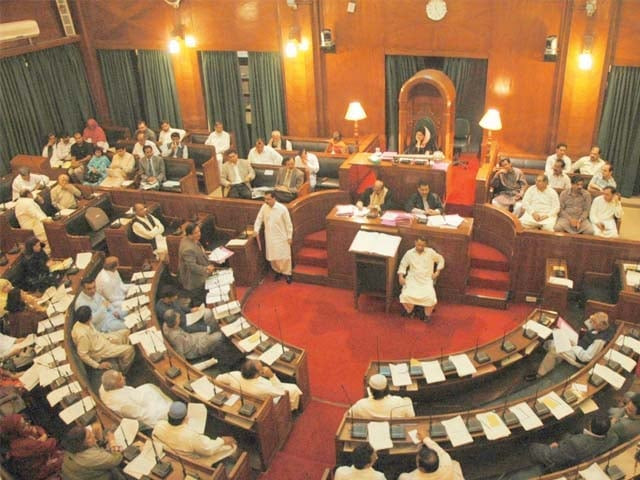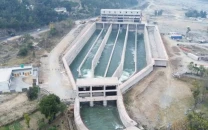A question of Sindh’s division
The PPP has to swallow the irony: the separatism of Sindhi nationalists is being opposed by a presumed MQM separatism.

In a rare show of an across-the-board party consensus (of the PPP, PML-F, PML-Q and the ANP) a National Peoples Party member proposed the moving of the following resolution: “No province can be created without two-thirds majority vote of the assembly concerned. This move may lead to a break-up of Sindh in future. We will not allow it. It is against the provincial autonomy.” The speaker, for the time being, disallowed the resolution aimed at “not only saving Sindh but other provinces too from the threat of fragmentation”, but the house heard angry reactions to what the MQM had proposed.
The MQM members sat patiently through the reaction but must have known what was coming beforehand. The party has been thwarted from claiming its local government control on the basis of its popular strength in Karachi and Hyderabad. The PPP has shown lack of resolve on the issue and has joined the ruling parties in other provinces in postponing the local bodies’ polls on one pretext or the other. The PPP’s central leadership has been rocked by the intra-party reaction to its dealings with the MQM although it denies that Zulfiqar Mirza has created any deep impression within party cadres in Sindh. The fear, expressed more clearly by the nationalists of Sindh led by Dr Qadir Magsi, is that parts of Sindh may be taken away from Sindh, thus offending the Sindhi ‘nation’ which, according to him, was promised a ‘sovereign state’ in the Pakistan Resolution of 1940.
The PPP has to swallow the irony: the separatism of Sindhi nationalists is being opposed by a presumed MQM separatism. The MQM, however, has other objectives to achieve. Its effort to become a national party through creating its presence in provinces other than Sindh, has been thwarted. Why it is convinced that it can spread its power of representation from Sindh to elsewhere in Pakistan was explained in the recent polls in Azad Jammu Kashmir and the representation it was able to achieve in the Gilgit-Baltistan region. It may be coincidental that it has fallen foul of the PML-N in Punjab and the ANP in Khyber-Pakhtunkhwa, and its ‘more provinces’ resolution in the National Assembly was seen as aimed at surgery in their territories.
The PPP is a national party which accepts the federation and opposes all kinds of separatism in Sindh, its political base. It has stood in the way of the Sindhi nationalist parties and prevented them from making headway, but its rivalry with the MQM dims the line dividing it from those who would change Pakistan’s federation into a confederation and create a new quasi-state out of the province.
The age-old formula for avoiding pressure on the federation is having more federal decentralisation. So far Pakistan has legislatively achieved this objective through the 18th Amendment without much promise to actualise it given the current economic weakness of the state. Whether we like it or not, the provinces will not reap the real fruits of this autonomy if they refuse to decentralise further. The PPP should let the ANP and the MQM contest Karachi and rule its local councils and avoid the larger issue of ‘more provinces’ for the time being.
Published in The Express Tribune, January 23rd, 2012.














COMMENTS
Comments are moderated and generally will be posted if they are on-topic and not abusive.
For more information, please see our Comments FAQ